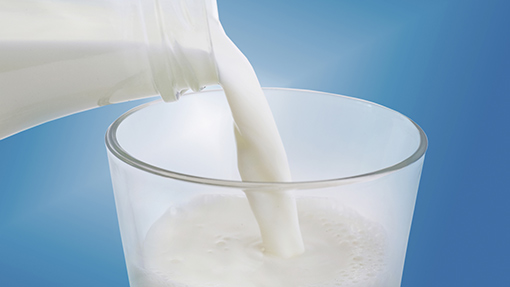Dairy industry hits back at Daily Mail milk claims

The farming industry has hit back over an article in the Daily Mail that advocates cutting back on milk consumption because it contains “pus” and “hormones”.
The article, “So that’s why you’re dog tired!”, and specifically the part of the story entitled “Healthy food that saps your energy”, has left farmers and their representatives fuming.
The piece, which was published in the print edition on Saturday 30 September, has met a storm of protest from farmers across the internet, who have said it is factually inaccurate and damaging to the industry.
An online version of the article has also been published, although this does not include the parts of the article that have most incensed producers.
Lines in the print edition include: “Cows are injected with hormones to keep them producing milk all year round and these pass into our milk.
“Milked constantly, they often get mastitis, an infection in their udders, which means they’re injected with antibiotics – which also pass into our milk. If that wasn’t bad enough, our milk is allowed to have a certain amount of red and white pus cells in it (400 million pus cells in a litre).
“There are even pus cells in some organic milk but far fewer. I try to reduce my intake of dairy products or you could find a reputable local farm shop and find out what exactly is going into the milk they produce.”
Amanda Ball, head of marketing and communication at DairyCo, said the organisation was leading a co-ordinated response to the piece.
“We are in the process of drafting a letter to the Daily Mail in response and considering whether to report it to the Press Complaints Commission.
“It is important we dispel these myths and reinforce our message. It is factually inaccurate and you could say it is misleading as well,” she said.
The piece was particularly disappointing as it had been written by a doctor, she added.
UPDATED (17.00pm on MOnday 1 September):
A joint letter from DairyCo, Dairy UK and the NFU has now been sent to the editor of the Daily Mail.
It reads as follows:
Dear Sir
“So that’s why you’re dog-tired” (Daily Mail, 30 August), is aptly titled, as the dairy industry is certainly dog-tired of the myths that surround dairy farming and dairy produce being reproduced as fact.
The piece about milk contains a number of inaccuracies. From the first assertion that cows are injected with hormones to keep them producing milk all year round through to pus in milk, it appears to be a study into how we can ‘Google’ as many incorrect myths and call them facts.
For example, cows are not injected with hormones to keep them milking all year round. This myth stems from the use of bovine somatotropin (BST) in some countries which is used to stimulate higher milk yields, but it is not allowed in the EU. To produce milk, a cow needs to complete a pregnancy, the birth of a calf starts lactation. Normally cows will have a calf each year having had 6-8 weeks of no milk production known as “the dry period”.
Sometimes cows require veterinary treatment for health problems. This may be hormones for reproductive issues or antibiotics for disease. However all treatments are for an individual cow depending on her needs. With regard to antibiotics, no farmer wants sick animals on his farm. But when animals do become ill antibiotics can play an important role in combating a bacterial infection and bringing the animals back to full health. The use of veterinary medicines is very carefully controlled by law and when veterinary medicines or antibiotics are used, the cow’s milk is not allowed to enter the food chain for a stipulated period, known as the withdrawal period.
It simply isn’t true to say there is pus in milk. All milk – including human breast milk naturally contains somatic (white) cells, which are critical in fighting infection and ensuring good health. The dairy industry monitors somatic cells to ensure that levels remain well below the permitted EU limit. In the UK, the average somatic cell count is around half of what is allowed within the EU.
While ignorance of dairy farming methods is worrying, inaccuracies concerning the nutritional content of milk call into question the author’s entire article. It is not accurate to suggest that people are intolerant to dairy as a whole food group, something which the author should be fully aware of.
Some people are intolerant to lactose – the sugar naturally present in milk. The main reason for this is that some people’s bodies don’t produce any (or don’t produce enough) of the enzyme which breaks down lactose. However, studies have shown that even people who have lactose intolerance can consume yogurt and cheese without symptoms – because the lactose has been either fermented in yogurt or lost in the whey fraction (liquid) of the cheese making process. For people who don’t want conventional milk, there are lactose free dairy products readily available.
It is inappropriate to recommend that people reduce the consumption of nutrient-rich food groups like dairy based on opinion rather than a medical fact. Dairy products like milk, cheese and yogurt contribute to the daily nutrient needs of the majority of people in the UK. Since most people are not trained nutritionists, they wouldn’t know how to replace the nutrients they would be missing if they reduced their dairy consumption. People who believe they may have a food intolerance should make their GP and a dietician their first port of call for proper professional advice.
Isn’t it about time to stop dozy articles and wake up to the facts?”
